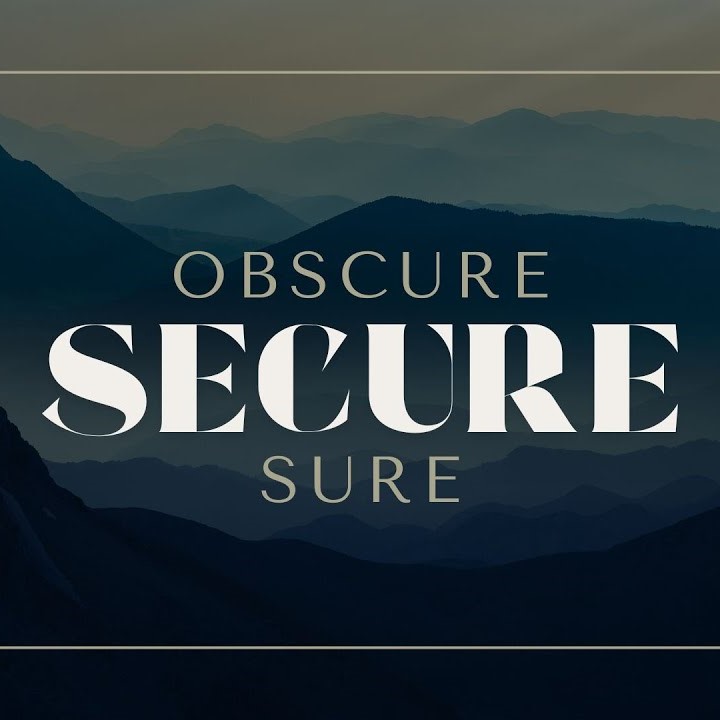[00:00:01] Speaker A: Hey, thanks so much for listening to this message. My name is Jason and I'm one of the ministers here at the Madison Church of Christ. It's our hope and prayer that the teaching from God's words you hear today will bless your life and draw you closer to Him. If you're ever in the Madison, Alabama area, we'd love for you to worship with us on Sundays at 8:30 or 10:30am if you have any other questions about the Bible or want to know more about the Madison Church, find
[email protected] Be sure to also check out our Bible study podcast, Madison Church of Christ Bible Studies. Thanks again for stopping by.
[00:00:38] Speaker B: Around this time last year, my family and I were driving up I65 heading north. We looked at the gas gauge and noticed we needed gas. So we looked for an exit that had a gas station. We exited, and whenever we exited and found the gas station that we wanted to visit, we noticed that there was a man holding a cardboard sign at the entrance of that gas station. I don't remember what the sign said, but I do know the man was asking and needing something. And so we pulled into that gas station. I got out of my car, and when I got out of my car, one of my kids pointed out, hey, dad, the man holding the cardboard sign is walking towards us. And then followed with this question, are we going to help him?
Now, I want to stop for just a second and share with you a little bit of something. This might be what we'll call a Confessions by Andrew moment. What went on in my heart and mind is not what should have been going on in my heart and mind. So I want to make that clear from the very beginning. I want you to know that I know that you know, okay? And so after I said that to him and that man starts walking towards me, the first thing that pops into my mind is my wallet. And I was like, well, in my wallet, I don't have any cash. And so as he's walking towards me, I said, sir, I'm sorry, I don't have any cash to give you. And then he followed it with this. Oh, it's okay. I wasn't wanting any cash. I was just gonna see if you could get me something to eat.
And so I looked right beside me where I was at, at that gas station. And I don't know if y'all have ever noticed at times where there's like a gas station, where there's like a driveway that's connecting the gas station to a fast food place that's what this was, there was a McDonald's right beside us. I didn't even have to pull out onto the road. I could just literally go through that little drive and get him something. So I turned him and said, well, actually, yeah, I can get you something. I said, you know, there's super conveniently a McDonald's right beside us. Would you like a hamburger? Would you like a cheeseburger?
And then y'all, he said this.
Well, actually, if you look a little further down that road, there's a Whataburger.
Could you get me some whataburger? And I was like, you know, a picky hitchhiker. And I was kind of like, what in the world? The audacity of this guy. You know, for our family, we've got, like, McDonald's money, not Whataburger money yet. That's what he's asking for. And so I very begrudgingly said, yep, that's fine. Would you like a hamburger or a cheeseburger? And if it doesn't get any better, he then gives me, no, I would rather have number. Whatever it was. I was like, now he's asking for a number, right? And so I was like, yeah, that's fine. And so I got in the car. I said, I'll be right back.
And I get in my car, and I'm heading down the street to Whataburger. And the kids ask, what are we doing? I said, we're going to Whataburger. And one of them, you probably can guess, he said, oh, I've always wanted to go to Whataburger. I was like, see, I knew your motivation was not where it needed to be. So we're in that drive through. And while we're in that drive through and I'm about to order this guy his number or whatever, very begrudgingly, my kids start telling me, well, I'm hungry. And then my wife brings up, well, we do have to stop. Anyway, we've already exited. We might as well get us something to eat, too. And so they give me their orders and their numbers and what they want to eat. And as I'm very gladly about to order for them what they want and what they needed, it kind of hit me.
Here I was trying to offer somebody else the very least, yet I was fine with my family having the best.
The reason why I share that with you is that's kind of what was going on in my mind as I was reading Jonah, Chapter one.
Jonah is a guy like a lot of us. He's experienced so much, yet he wants to offer other people the very least.
Have y'all noticed at times we have a tendency to do that with a lot of things? Like we want other people to be where they need to be. We want other people to be the finished product, yet we want God to give us the grace and the time develop.
And the reason I say that is that's kind of the situation Jonah was in. So this morning, Brandon and I are starting this new series on the book of Jonah. And I don't know what pops into your mind when you think of Jonah, but I know for a lot of us, you might think, well, you know, if there are two Bible narratives that I heard the most growing up, it's Jonah and Noah in the ark, you know, and when you think of Joni as that story of that guy that was inside the belly of that fish, and he lit a candle, got spit up on the shore, and turned into a real boy. Right? That's Pinocchio. But, no, the reason I say that is we have a picture, I think, in our minds of what this narrative is all about.
But what I want us to see is the reason this is in Scripture is for two reasons. One of those reasons is to point forward to the fact that we all need a better prophet, and that's Jesus Christ.
We're going to point to that as we continue throughout this series, and you're going to see those connections. But the second reason this is in the text is because of something that I love, that Aaron shared in his Scripture reading when he said this.
I don't know about you guys, but when I read all the different prophecies in the prophecies, there's something about Jonah to me, that is just so relatable, and that is part of the point of why it's in the text.
Did you know that every year on Yom Kippur, that at the synagogue, when the Jewish families and the Hebrew families, they meet, did you know that they read aloud the book of Jonah, and they all say in unison this phrase, we are Jonah, that there's a little bit of Jonah inside of every single one of us, that those of us that have experienced the most, sometimes, if we're not careful, can have the heart, the mindset to offer other people the very least.
So I want us to dig into this text today, and we'll start in Jonah, chapter one. And as we begin in verse one and verses chapter one, verses one and two, you get to meet the three main characters of this narrative. This is what the text says. This is the word of the Lord came to Jonah, the son of Amittai, saying, arise, go to Nineveh, that great city. Call out against it, and notice what it says here, for their evil has come up before me. That phrase is very important. Now let's dig into the three people that we know that are going to make up the main part of this story. First, you have God the Father. He's a constant throughout this narrative. Then we meet a guy named Jonah.
I don't know how to paint this, except for the fact that if there was a little Hebrew boy or girl, that if you ask them when they were growing up who they would want to be like, who they looked up to, who was their nation's hero at that time, it was Jonah. Jonah had it all. Jonah had money, he had popularity, he had power. But here's the problem that Jonah faced, and I think we all face this a little bit, especially I would say right now at this time in our world, is this. Jonah had more commitment to his country than he did to his God.
And I know this might sound like a weird way to put this, but he focused more on being Israel's preacher than God's prophet.
Now you might think, well, what's wrong with that?
Well, sometimes if you're not careful, what you can make your motivation be is, well, I'm gonna tell these people what I know, and I'm gonna share with them even the right things. But yet your motives can sometimes be wrong, that you forget that you're called to be the voice of God, not just someone sharing information. God's not after information exchange. He wants not just the messenger to change their heart, he wants the message to change our heart. And so that was kind of the dilemma Jonah faced.
He was the guy that everybody loved and looked up to. And what you're gonna find is he actually started to make that an idol in his life.
But what about Nineveh? Now, I want to go ahead and warn you, what I'm about to share with you is graphic. And the only reason I share it is because this narrative, I don't think will mean what it should mean if we don't understand a little bit of background of who the Ninevites were. Nineveh was the capital city of the Assyrian Empire, and Nineveh was a very great big city. In fact, you'll read in, I think it's chapter three, verse three of this text, how when Jonah's just walking across their metroplex, it took him three days. So we're talking a big, big city. Especially for that time. Ancient history says that its walls were so fortified that you could put three chariots beside each other and do laps around their walls. That's how thick and impressive this city was. But when it says in the text right there that they were very evil, here's how evil they were. They were basically like a old school Isis that whenever Ninevites would go into a community and people knew Ninevites were coming, a lot of the people in those communities would take their own lives because they didn't want to have to deal with the Ninevites.
When the Ninevites would go into a city or a group of people would come, even attack them, the men, the women and the children, they would kill. They would skin and put their skins over the city walls to send a message to everybody else.
They would bury people up to their necks in sand, nailing their tongues to the ground. They would stack dead bodies at the entrances of their towns just so they would say, hey, if you try to do something to us, that could be you.
The reason I share that is that when God tells Jonah to go and he very clearly says no, here's what we know about Jonah is Jonah, in his mind has a very good reason why he doesn't want to do what God wants him to do.
And maybe you have a really good reason sometimes why you choose to not do the very thing that you know you should do.
Well, God, you know how they are. I mean, I can't go there.
And they, as we're gonna find out later, they don't deserve this. So this is what it says. Jonah rose to flee.
And notice what it says. It mentions this twice in the text from the presence of the Lord.
See, one of the reasons Jonah did not want to go is we're gonna learn about later. There's a text where it says, I knew God. You were a kind and a compassionate God. Very slow to anger, abounding in love.
See, here's what happened to Jonah is Jonah was okay with the mercy of God when it applied to him. But he was not okay with the mercy of God and the grace of God if it called his own supremacy into question.
See, Jonah idolized his own identity and how other people saw him. And by going there, it might step on his own toes.
But the other thing that I notice in this text is it kind of calls into question what we might define rebellion as. So if I asked you, would you say you're rebellious to God? I would dare say most of us would say no. Cause here's what I've done before. I've said, well, I'm not rebellious to God. And here's why. Because I'm not as bad as those people. Like, I don't do those kind of things. I worship every week. We, you know, give every week. We pray. We, you know, go to all these things. And I'm not like those folks. So, no, God, I'm not rebellious. We view our walk with God through the means of comparison. Yet when you go through scripture and what we're going to see today is you want to know what rebellion against God is? It's simply this saying no to God. That's what rebellion is. It's not comparing yourself to where other people are. It's saying no. So I want you to think about that for a second. Where in your life right now are you telling God no?
And also, by the way, when you tell God not yet, you're telling him no. Where in your life are you doing that?
And I came across this quote that I thought was really good. It says this. You are never further from God than when you're close to him and still say no. Here's why this quote, I think, is so important with this text.
If you go back to the verse we just read, it said that he was trying to run away. From what?
The presence of the Lord. It says that twice.
And you and I know, like, in our minds, yeah, I can run from God, but you can't outrun God. Right.
But the other thing is that word presence in the Hebrew comes from this word panam, which means face.
So here's what the writer is trying to help us to understand. Jonah is doing something that we maybe don't realize we're doing, but we're doing it. And it's this. He's trying to still call himself a child of God. He's still obeying certain things of God.
But when it says he's fleeing the presence of God, what it's actually saying is he doesn't want to look at God's face.
It's the idea that I can still obey certain things. I can follow the rules. But I know if I look at his face, I'm going to have to go to Nineveh.
If I look at his face, I'm going to see those people. Here's why. Because God loves all people.
And so what he's gonna challenge me to do is to go love people that are very difficult to love, to forgive people that are very difficult to forgive. So what I wanna do is I wanna follow these things. But I can't look at your face.
If he looks at his face, he's going to Nineveh.
And so that's what he's fleeing. He's not fleeing necessarily the commands of God, but he is fleeing the face of God. And so it says this. So Jonah rose to flee to Tarshish from the presence of the Lord. There's that phrase, it says he went to Joppa and he found a ship going to Tarshish. He even paid money to go down there and went away from the presence of the Lord. Now if you were to get a map out, and you can even do this today with Google Maps, and you were to try to figure out, all right, how far did Jonah go out of the way to dis. Disobey God? So where God called him to go was 500 miles. You're like, well, that's far. But you know where he went to avoid what God wanted him to do, 2500 miles.
And I know we don't think of it like this, but don't you think sometimes we work harder at disobeying God than sometimes obeying Him?
Like, I think we can be some very creative disobeyers.
We can go 2,500 miles out of the way just to avoid the very thing that we know we should do. I'll give you this example. Take forgiveness.
Maybe there's somebody in your life that did you wrong, they hurt you, and it's really, really hard to forgive them. So what you'll do is the right thing would be to go 500 miles.
But yet you avoid them, you won't look at them.
And so you go 2500 miles. And all along that 2500mile journey, you're dealing with bitterness inside because you haven't walked 500 miles to make things right.
And the reality is that there's always, as we mentioned this morning, as you saw in that text, there's always another option.
In fact, one of the things that Brandon put in the outline is this, that you can always find a boat, a ship going the opposite direction of where you want to go. This is Satan's mo.
The way that Satan operates is to constantly provide a ship, something else that's going in the opposite direction.
But the reality is just because something might be the ready way, that doesn't mean right, it's the right way. We sometimes choose, like, the path of least resistance. Yet God's like, hey, whoa, whoa, you're being very creative to go out of the way of where I want you to go. And by the way, have you all thought about this? This is the way that God paints a picture of how Satan operates. Satan wants to give us a false peace about our disobedience.
It's kind of like in the book of Genesis, in Genesis 3, when Eve is like, hey, God told us not to eat of this. He goes, oh, well, actually, if you eat of it, you'll be wise.
Oh, well, it's just wisdom.
What at times can we do the same thing with? Well, it's just this.
Well, it's just that. And so what we end up doing is we follow sometimes the peace. That's a false peace in our hearts instead of actually following God's word.
And so here's what it goes on to say that the Lord started to cause this great wind upon the sea. There was this mighty tempest on the sea, and it was threatening that ship to break it up. And then this is what it says. Then the mariners were afraid and each cried out to Jonah's God. And let's just stop there for a second. Is this not the best opportunity ever for Jonah?
Like, they're like, hey, wait, we know you are associated with God. He has a moment. And it was making me think this past week about all those different moments we are presented with when people know that we are a child of God. And they're like, hey, I need you to do something.
They cry out to him for his God to do something. And then it says this. They started hurling cargo that was in the ship into the sea just to lighten the load. But notice this. But Jonah had gone down into the inner part of the ship and laid down and was fast asleep.
That last sentence in the text is very symbolic in the Hebrew, if you've noticed something about the way Jonah's written, even how it's indented in your Bibles, it appears and looks like poetry. And part of the reason it's written in that way is a lot of this is symbolism. When it says that he went down and was fast asleep, those words in Hebrew are actually trying to imply that he's in a spiritual downward spiral. It's the idea that I'm going down in this boat and I know what's going on out there, but I'm going to go down here and I don't care.
He's in what people call, like, a state of indifference.
Have you ever been to one of those before? Or maybe, you know, a family member, a friend, that you wanted them to so badly change things, you wanted them so badly to want it, and maybe You've been in a situation before, like, you want it for them, but you can't make them obey. And it's like, just want it. And they're like, I don't care.
That's where he was at.
He was in this downward spiral. And then the captain says to him, like, how can you sleep at a time like this?
And notice what he asked him to do?
Hey, can you pray and call out to your God?
Perhaps the God will give a thought to us so we won't perish.
Isn't it interesting that he wants him to pray?
But please notice Jonah won't do it.
Do you know why Jonah won't pray?
Because he could pray, but that prayer would just be a mere pretense that maybe you've been in a spot before that you almost feel odd in the fact I'm praying for this while I'm simultaneously making a poor decision.
And so what they think. They think the problem is what's happening outside of the boat. But what they're about to find out is the problem is with the person inside the boat.
And the reason I mention this, and yes, I know we think about our young people and what they're dealing with all the time, but this happens to all of us. But I will say, especially when you're young, you might be like, well, why am I going through this storm? Why am I going through this difficulty? Well, I'll go ahead and tell you. A lot of times it has to do with who you've allowed into your boat.
Or maybe we could say this. Who you've allowed into your phone.
Maybe you need to slide right, delete, because that person is bringing you down.
The problem was with the person that they had allowed in. And so they said, well, tell us on whose account this evil has come upon us. Like, what's your occupation? Where do you come from? What's your country? And of what people are you? And this is what he said. Well, I'm a Hebrew.
And then he says this. I fear the Lord, the God of heaven, who made the sea and the dry land. Wait, hold on a second. So now you're saying that we notice two dilemmas that Jonah faced that I think we've all faced. And it's this.
One of his problems is pride.
He was okay to claim God and to even know his commands. But man, don't make me look at his face and I'll be Israel's preacher but don't make me go love them.
Pride stood in the way. But here's what we know about Pride. I mean, think about, like, the seven deadly sins as we know them as. Do you know what they all have in common? All of those begin with this one thing. Pride.
Pride is the chief instigator of every single sin we commit. And here's the danger of pride. Pride never just stays pride. It eventually opens the door for other things. And so, because Jonah had this pride in his life that he knew best, that he knew what should be done, he didn't even leave open the possibility that what God's wanting him to do, yes, it's new, yes, it's different, yes, it's a challenge. But that's where God usually operates. It's an interruption. I heard something this morning that was so interesting that 75% of the miracles of Jesus were during a time of interruption.
It was never something that was always easy. So what happened to him? He let his pride get in the way. And here's what became an idol for him, his identity.
He wanted to do what he wanted to do while still holding the title.
I'm a man of God. I fear the Lord.
And so, as we continue to read the text, it says this. The men on the boat, they were exceedingly afraid.
Now, these guys on a boat, these are like the manly men. They've seen some storms, so this was a big one.
And they said, what is this that you've done? So now they know the problems with the person in the boat.
For the men knew that he was fleeing from the presence of the Lord because he had told them. Then they said to him, what shall we do to you that the sea may be quiet and go quiet down for us? For the sea started to grow more and more tempestuous.
Notice that Jonah's disobedience did not just impact Jonah, it impacted other people too.
You and I, we never sin alone. We never sin in private. There is no such thing as an isolated sin.
I love what was mentioned this morning by Stan in the Giving. Like, he made a really good point that I was thinking about. For us as, like, parents, if we as moms and dads are very materialistic and not generous, our kids are not going to be generous and are going to be very materialistic.
But also, if we as parents are half asleep in the bottom of a boat, I think our kids are going to be completely asleep in the bottom of a boat if we don't first make the hard decisions ourselves, choosing sometimes those hard decisions over the. The easy, wrong ones.
And so Jonah here, his disobedience impacted other people. And so they picked him up, threw him into the sea, and then the sea ceased from its raging. And notice what it says here. The Lord appointed a great fish to swallow Jonah, and Jonah was in the belly of the fish. Three days and three nights.
The Lord. And look at this word. We're gonna come back to this at the end of the series because it shows up over and over again in this text. The Lord provided a great fish.
Now, I want to stop here for just a second.
Do you think that Jonah, at this time in his life, sees the fish as provision, or does he see the fish as a problem?
Because Brandon's going to share with us a little bit next week about the part where he's actually in that fish.
I would dare to say that he was probably thinking, hey, is this the way you had to get my attention? Like, a hotel would be better?
A campground would be fine. I'll take a tent. You know, I'll even take a manger.
No, the belly of a fish. Is that what you're gonna pick?
So I wanna give you these quick lessons. Number one, not every single thing that engulfs us, not every storm that we go through, is actually a curse from God. Sometimes it's God trying to grab and get our attention.
But when you think about what Jonah's experiencing here, when it says the Lord provided, he's like, man, could you pick another word that a lot of times, the provision of God. Let me say this, let me back up.
The provision of God, more often than not, does not come wrapped in what you prefer.
Because then it wouldn't truly be provision and it wouldn't be faith.
You think about Faith hall of Fame. And what makes all of those examples, examples of faith is they all had to stretch and do something they had maybe never done. That was uncomfortable. That was a challenge to uproot a family, to move in a new direction. Whatever it was, faith is not comfortable. And the moment it becomes comfortable, sometimes it stops being faithful. But the other thing that is so amazing to me about this text is how blatant he is about his disobedience.
Okay? Not only does he go 2,500 miles the opposite direction, y'all, he pays money to do it.
And then, you know, he goes down to the bottom of the boat when he knows he's the problem. The guys are like, hey, can we call on your God? He's like, I mean, he has so many opportunities, yet he does over and over again the wrong thing. And yet God is still faithful to that guy in his disobedience. Is that not encouraging to us that God still pursues and goes after us even in our disobedience.
But the final thing I want you to think about is this, is that knowing the pride that he dealt with and that eventually led to him idolizing his own identity of how other people saw him.
I think part of the reason why he sent this storm is to break him from a self reliance that I know what they need. I'm gonna do what I think I need to do. And God wanted to break that.
And so as we conclude this morning, I want you to think about right now that question I mentioned earlier. And it's this. What is something in your life where you have said no to God? That's rebellion.
Or maybe we could think of it like this. What's something in your life where you need to say yes to him in.
I was listening to a podcast and dads, if you need a good podcast, a Christian one, it's called dad Tired. It's really good. It's a funny title and I usually listen to it when I'm tired. But he gave an example. He had interviewed this Bible professor, and the Bible professor was there answering questions to the different people that listen to the podcast. And the guy said, all right, as a man that by title I would call myself a Christian, but yet I keep struggling with this sin over and over again. And I feel like Satan has kind of given me this peace, that this is my struggle.
And he said, and it really is. He said, but I feel like Satan's kind of trying to use that to get a grip on me. So I won't let go of stuff like, what would you say to help somebody like me? And I love this analogy.
He said, well, I want you to imagine for just a second that your child is out there somewhere.
They're not with you, but you know they're out there. And so what you have to do, according to them is you gotta get rid of some stuff.
You gotta get some stuff or whatever it is in order to see your child again. What are you gonna do?
Well, we're going to go get some stuff or we're going to get rid of some stuff. Why? Because we know that that very important relationship is out there somewhere.
Now, what about the most important relationship?
What would we be willing to say no to and yes to?
To be joined back to the most important relationship.
Maybe you're here today and you've dealt what we've all dealt with, which is kind of like, Jonah, I'm praying about something while simultaneously choosing the wrong thing maybe for some of you, what it is, is the danger is who you've allowed into your boat.
And that's become a big problem maybe for you today. You've never made that decision to give your life to Christ. You've been thinking about it, but you've also seen how we talked about today, the danger of self reliance.
Satan, I'm telling y'all, he will give you a lot of small victories.
So you will think that you don't need God, maybe this morning you need to be broken from that self reliance to give your life to him through baptism.
So if you're here today and you want prayers, prayers to maybe start saying yes to something, no to something, you can go to one of these exits every single Sunday. We have shepherds that are standing at those doors ready to pray for you.
We had a sister in Christ that came Forward at the 8:30 service this morning. And one of the things that she shared with us, that she had been dealing with is kind of what Jonah dealt with. She said I was kind of in that state of indifference.
I knew I needed to change things and needed to step it up. I just haven't done it.
And so she prayed for strength to remove certain obstacles that she knows that are standing in the way. Maybe that's what you need prayer for this morning. So whatever it is, we want you to know that we have a God, that his eyes are going back and forth all across this earth trying to find people to strengthen. That's who we serve. So if you have a need, please, please come while we stand and we sing this song together.





